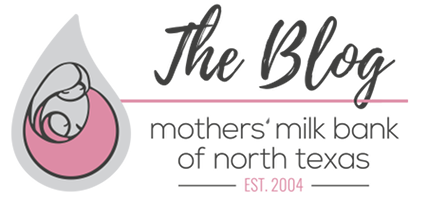 Mothers' Milk Bank of North Texas values so many of our fellow non-profit organizations serving the local community, especially those who help the women near and dear to us . . . moms. We work closely with mothers every day, who generously donate surplus breastmilk to help sick babies. And since many of us on staff are moms, we know firsthand about the challenges that can come after that precious bundle of joy arrives, and how in some cases, it doesn't feel completely joyous. Postpartum depression (PPD) is one of the most common complications after pregnancy. One Dallas organization, Wings for Wellness, is dedicated to helping women and families by raising awareness and providing helpful resources and education. Shelley Shook and Karen Erschen founded Wings for Wellness in 2009 after both had suffered and recovered from PPD.
Mothers' Milk Bank of North Texas values so many of our fellow non-profit organizations serving the local community, especially those who help the women near and dear to us . . . moms. We work closely with mothers every day, who generously donate surplus breastmilk to help sick babies. And since many of us on staff are moms, we know firsthand about the challenges that can come after that precious bundle of joy arrives, and how in some cases, it doesn't feel completely joyous. Postpartum depression (PPD) is one of the most common complications after pregnancy. One Dallas organization, Wings for Wellness, is dedicated to helping women and families by raising awareness and providing helpful resources and education. Shelley Shook and Karen Erschen founded Wings for Wellness in 2009 after both had suffered and recovered from PPD.  Wings for Wellness holds support groups and events and posts research updates on their Facebook page. For example, a recent post provides a link to an insightful article: "The 6 Stages of Postpartum Depression". In May, Mothers' Milk Bank of North Texas will participate in the Wings for Wellness 5th Annual "Motherhood Matters" Pregnancy/New Mom Expo at the Richardson Civic Center Grand Hall. Admission is free to the public. You have probably heard it before, "If mom isn't happy, no one else is." Far more challenging than a case of "the blues", postpartum depression is a serious medical condition that has implications for the whole family. One out of every eight women will experience PPD after giving birth. It can be confusing and isolating and make bonding with a newborn difficult. The issue has been in the spotlight recently with celebrity Hayden Panettiere, who announced she is seeking treatment for PPD. The March of Dimes website encourages women, with five or more of the following signs of PPD that last longer than 2 weeks, to contact their health care provider for help.
Wings for Wellness holds support groups and events and posts research updates on their Facebook page. For example, a recent post provides a link to an insightful article: "The 6 Stages of Postpartum Depression". In May, Mothers' Milk Bank of North Texas will participate in the Wings for Wellness 5th Annual "Motherhood Matters" Pregnancy/New Mom Expo at the Richardson Civic Center Grand Hall. Admission is free to the public. You have probably heard it before, "If mom isn't happy, no one else is." Far more challenging than a case of "the blues", postpartum depression is a serious medical condition that has implications for the whole family. One out of every eight women will experience PPD after giving birth. It can be confusing and isolating and make bonding with a newborn difficult. The issue has been in the spotlight recently with celebrity Hayden Panettiere, who announced she is seeking treatment for PPD. The March of Dimes website encourages women, with five or more of the following signs of PPD that last longer than 2 weeks, to contact their health care provider for help.
- Feeling depressed most of the day every day
- Feeling shame, guilt, or like a failure
- Feeling anxious a lot of the time
- Having severe mood swings
- Having little interest in things you normally like to do
- Feeling tired all of the time
- Eating a lot more or a lot less than is normal for you
- Gaining or losing weight
- Having trouble sleeping or sleeping too much
- Having trouble concentrating or making decisions
- Having trouble bonding with your baby
- Thinking about hurting yourself or your baby
With the right treatment, there is light at the end of the tunnel. A mom should never feel alone in her journey after childbirth. Help is out there and statistics show that with adequate support, "this too shall pass". ___________________________________________________________________________  If your freezer is full of breastmilk your own baby won't use, consider becoming a donor to help premature and sick babies. Contact Mothers' Milk Bank of North Texas here.
If your freezer is full of breastmilk your own baby won't use, consider becoming a donor to help premature and sick babies. Contact Mothers' Milk Bank of North Texas here.
